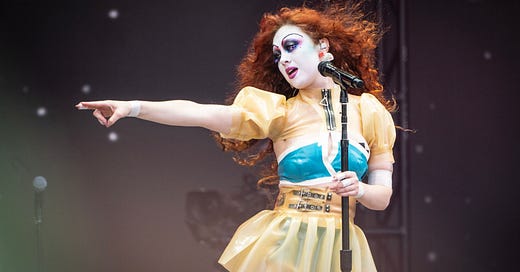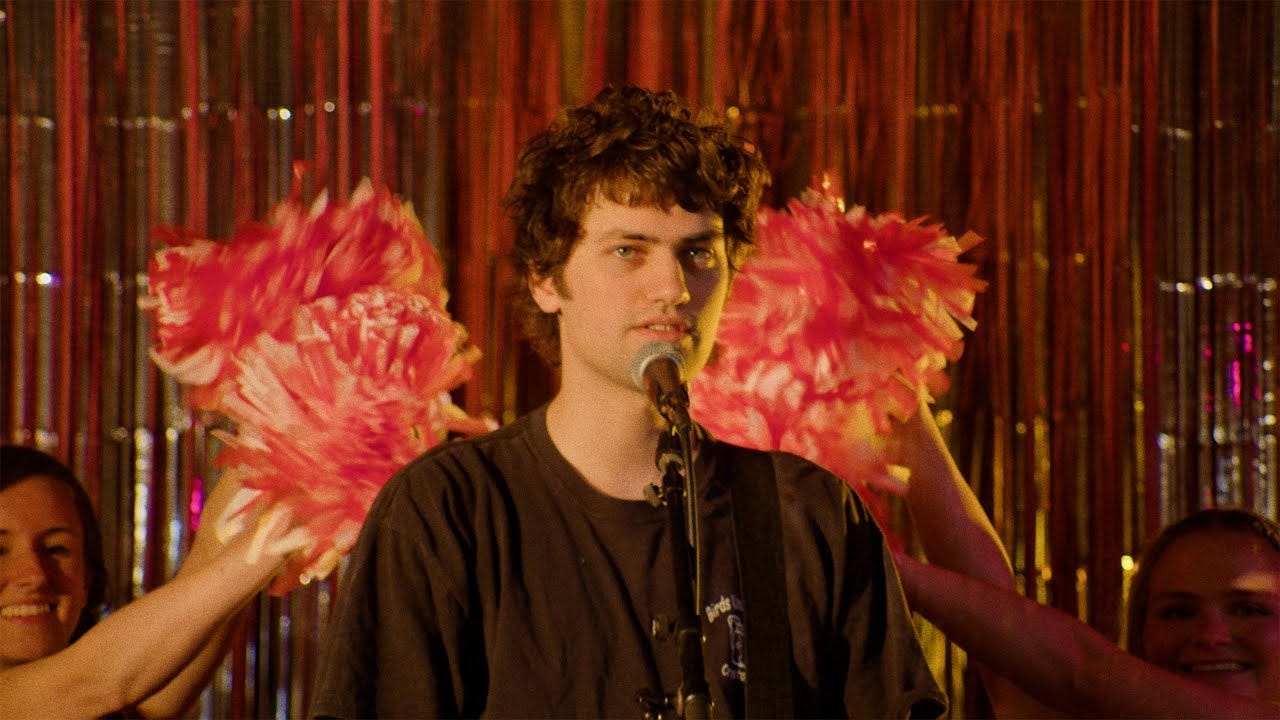The Songs of the Decade: "TLC Cagematch" / "Casual"
On wrestling, anxiety, and two songs that, in their own ways, talk about death
Been a minute.
I’ve mostly dropped the ball this year on 2024-in-review content—a music review is coming, although I might unfortunately skip my annual EOY video this year due to a lack of time—so I’m making up for it by going full sail on a suite of mid-decade pieces on my favorite films and songs of the 2020s so far. For the music part of it, I’ll be writing at length (and I mean length, as you’ll soon find out) about my 10 favorite songs of the decade, interspersed with guest pieces (a first for the newsletter!) from some of the most talented people I have the privilege of calling friends, each talking about a few songs they loved from the past five years. It’s all happening on the La Loma Review this 2025.
Here’s the full playlist of the 100 Best Songs of the 2020s (So Far).
In case you missed any of our prior newsletters for this series so far:
Top 10 (all by me): “TLC Cagematch” / “Casual” | “American Teenager” / “People, I’ve been sad” | “Silk Chiffon” / “anything” | “Hard Drive” / “Somewhere Near Marseilles” | “It’s Not Just Me, It’s Everybody” / “Welcome to My Island”
Guests: “Starburned and Unkissed” by Gian Balangue | 3 K-Pop Songs by Justin Nava | “Huwag Muna Tayong Umuwi” / “The Loneliest Time” by Emil Hofileña | “My Love Mine All Mine” by Ashley Ranich | “Billions” by Niki Colet | “party 4 u” / “Will Anybody Ever Love Me?” by Currie McKinley
10. MJ Lenderman - “TLC Cagematch”
If you haven’t yet been swept up in the thrall of Wrestlemania, you might not understand what the big deal is with professional wrestling. Even for enthusiasts and students of the medium, its appeal is maddening to explain. Part of that is the identity crisis that comes up when you begin to even ask what it is. Wikipedia describes it as a form of athletic theater, while the WWE, the most prominent iteration of the form in mainstream media, has coined it “sports entertainment”. Since its invention, pro wrestling has always been two different and often contradictory things improbably existing together—athletics and theater, sports and entertainment, faces and heels, works and shoots.
Ecstasy, yes, and agony too.
[TW for the two Wikipedia links in the next paragraph, but in the interest of thoroughness, they must be mentioned.]
Despite the most common potshot levied at it being its scripted nature, it is impossible to tell the story of pro wrestling without dovetailing into the very real sorrow and destruction that litter its history: Owen Hart free-falling 65 feet from the rafters onto a ring post due to a faulty harness, the stabbing of Bruiser Brody in a locker-room shower and the ensuing sham trial that acquitted his killer, the litany of pain endured by the Von Erich family that was so overwhelming that their biopic had to tone it down. Chris Benoit. Vince McMahon. I could go on.
These are just some of the lowlights, but there are more everyday tragedies too. Think of a beloved wrestler from before the 2010s, and it’s likely that they died young, whether due to substance abuse, accidents both in and out of the ring, or simply the inevitable after-effects of wrecking one’s body for decades under the bright lights. If professional wrestling in America is built on anything, it is death—its looming presence and its eternal, uncertain possibility.
And yet, for the initiated, there is beauty there too: Not due to all the death and pain, but alongside and despite it. It’s there at the crest of Iyo Sky’s moonsaults, and the arc of a crisp Chad Gable suplex. It bubbles up whenever Sami Zayn or Becky Lynch grab a microphone, or whenever the crowd comes alive once Rhea Ripley or Cody Rhodes’s music hits. Even as a child, I could see it whenever John Cena or Shawn Michaels got up, bloodied but not beaten, from what seemed to my young eyes like onslaughts no man ought to be able to get up from. Beauty is not borne out of death and pain, but out of the defiance of it. In the hands of its very best practitioners—Michaels, Cena, Lynch, Jeff Hardy, CM Punk—pro wrestling can defy, for a moment, death and pain and tragedy and gravity: A visceral and quintessentially American form of poetry.
Speaking of American poets…
If you haven’t yet been swept in the thrall of Lendermania, you might not understand what the big deal is with MJ Lenderman. Even for enthusiasts and students of the man, his appeal is maddening to explain. At first glance, he looks like that one stoner friend we all knew as a teen: Messy hair, sleepy expression, a reedy voice whose singing sounds almost obligatory. Before spinning off into solo side projects, Lenderman came into alt-prominence as the guitarist for the shoegaze-country band Wednesday, but his music zags away the group’s distinctive noise-grunge sound and mostly features just him, sparse instrumentation, and minimal distortion.
And yet, if you can believe it, he might be America’s best working songwriter, if only because his songwriting is so uniquely attuned to the American spirit. His breakout record Boat Songs is astonishing not because it consists of songs that sound radically new, but because it accomplishes the arguably harder task of containing songs that you’d swear have been part of the great American songbook for decades. Wry, observant, and unmistakably authorial, it is an album that feels both familiar and fresh—two more different and contradictory things improbably existing together
On “TLC Cagematch”, Lenderman casts his lens on that most American of pastimes, understanding that the only songs one can write about pro wrestling are dirges. It unfolds in a haze, its depiction of the genre more a collage of remembered images (a battle royale generally does not take place in a cage) than any attempt at realism, juxtaposing flash-bulb moments (It’s hard to see you fall like that / Though I know how much it’s an act) with more tactile portraits of decay (Like your shoulders, your hips and knee / They all hurt you, but they will work). In a certain light, it might almost resemble a dying dream.
Lenderman’s lyricism here is suffused with recursion and economy, nostalgia and disappointment. It’s not the same as when we were boys, he sings, less out of spite and more out of burdened knowledge. That’s why you do what you gotta do, the chorus begins, a surrender to reality’s humiliations and compromises, not even remarkable enough for specifics. You said you’re gonna be, like, our hero someday, the song remembers, before the kicker: Well, baby—all our heroes now are dead.
Both life and pro wrestling, Lenderman suggests here, are studies in entropy: Who you are in the end is who you were in the beginning, only less so. All things go.
And I know why we get so fucked up. I do.
9. Chappell Roan - “Casual”
My friends tell me I need to be more chill; ball of anxieties that I am, I certainly have room to do so. I am the type of person to double- and triple-check the logistics on loose plans. I arrive at airports five hours before my flights, and I pack for them a week in advance. 40% of my Uber rides begin with me asking the driver to circle back around so I can check if I’d locked my front door one more time. I am always looking around and behind and below me, as if I couldn’t trust even the ground I was walking on, as if everything were fragile, capricious, and new.
I have never had a light touch. I grip too tightly and too recklessly, and if the rope slips, I come away burned.
This bleeds into my interpersonal life as well, as I am just as skeptical of my own object permanence as I am of the world’s. I stitch my friendships like intricate quilts whose ease and comfort belie the intentionality behind their craft: One knot purled after another, each its own form of prayer. I have never been in a proper romantic relationship—which is perhaps related to all this—but I suspect it will be much of the same. I can’t even write about this sort of thing without borrowing words from religion. Maybe the only love language I will ever speak fluently is devotion.
Throughout her debut full-length The Rise and Fall of a Midwest Princess, Chappell Roan is many things—rebellious (“Pink Pony Club”), vindictive (“My Kink is Karma”), indignant (“Super Graphic Ultra Modern Girl”), profoundly horny (basically every other track)—none of which is anywhere within the area code of “chill”. Over the entire suite, Roan barrels pell-mell into the zeniths of lust and nadirs of love, moving exclusively in the emotional spaces where ecstasy and agony mix and mingle perhaps too readily. It’s an album that sounds like the polar opposite of anxious until you realize that anxiety and abandon are both just different apples from the same tree.
We grip too tightly and too loosely both out of fear of coming away burned.
The lynchpin of it all is “Casual”: A bolt of agonizing insecurity in the middle of an album that mostly traffics in self-assuredness. My friends call me a loser, Roan whimpers to open the song, amid a steady thrum of synths, like a high tide rolling in: I’m still hanging around. The song plays like a slow drowning, with the music growing louder and louder as Roan digs herself deeper (I thought you thought of me better / Someone you couldn’t lose) and deeper (Dream of us in a year / Maybe we’d have an apartment).
I know, baby: No attachments.
The tide rises.
But we’re knee-deep…
By the time the bridge rolls along, Roan’s voice is almost lost in the mix, half-buried in layers of instrumentation and ghostly backing vocals. Through it all, she persists (My favorite bra lives in your dresser) and insists (I’m on the phone talking down your sister) and even relents (I try to be the chill girl / But honestly I’m not), yet the tide keeps rising. Finally, on the last line, a throttled scream pierces through as the rest of the song falls away, in a cleansing moment of clarity…
You can go to hell.
A few months after the release of …Midwest Princess, Roan would be thrust into pop-stardom by way of “Good Luck, Babe!”, another aching, raging scorned-lover paean that hinges on a similar question as “Casual”: Why couldn’t we be more? However, while the latter is a submersion, the former is an ascension, with Roan’s voice operating in an immaculate coloratura as opposed to the lower register in most of “Casual”.
They could almost be two halves of the same story: A death, and a resurrection.
(There’s religion again.)
Hope you’ve steeled your inbox, because mid-decade content is going to be coming fast and furious from the La Loma Review. We’ve got 8 more write-ups from me, but as mentioned in the intro, we’ve also got an all-star suite of guest pieces. Do subscribe if you’re interested, and do drop a line if you have thoughts, complaints, or just want to chat Chappell or MJ.



